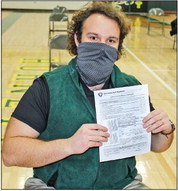“What public health is about ….


“What public health is about is prevention,” she said. “So we’re really happy to be a piece of the prevention.”
With that being said, Mews said it’s imperative that others continue to follow health and CDC guidelines until they complete their vaccinations.
“Aftervaccinationwewanteveryoneto continue following all the recommended precautions of social distancing, masking, hand hygiene, avoiding large gatherings and continue to do those things even after vaccination is completed,” she said.
Even as one group rejoiced at receiving their vaccination, the push to vaccinate has been met with resistance. Anti-vaxxers and a wary public have hesitated to receive an injection from something that has been developed so rapidly.
For comparison’s sake, the fastest vaccine prior to the COVID-19 vaccines was for measels in 1980. That vaccine took four years to complete.
But science has advanced in leaps and bounds in the past 40 years.
Kris Woik, a teacher at Colby Elementary, noted that there was a great deal of hesitancy surrounding the polio vaccine when it was first introduced to the public some 60 years ago.
“I’m very thankful that we have a vaccine. I’m not scared that it was developed quickly,” she said. “I think that’s what we rely on science for. You have to make your own decision, but I thought right out of the gate on this one, somebody had to be the first to get the polio shot.”
Other teachers encouraged their communities to get the shot when it becomes available to the larger public. Not only will it cut down on quarantines, says Colby High history teacher Mike Sazama, it will help get things back on track.
“I think that getting the vaccine will give people peace of mind that we are doing everything we can to stop the spread,” he said. “It’s something we can all get through working together. If we stick together, keep practicing proper safety techniques, get outside and be active, it will help us all get through this thing.”
Most said that getting the vaccine will ultimately be a personal decision, and while there are concerns over side effects and long term effects, most agreed the potential for good outweighed any negative consequences.
“I would recommend people doing it, because just the other day I heard the father of one of my son’s co-workers had passed because of COVID,” said Colby High secretary Patti Rau. “It’s still out there. One sick day seems like a small price to pay to save someone’s life.”
The second dose of the vaccine will be administered on March 31, and while more side effects are possible, those who got their first vaccine have no problems coming in for their second shot.
“It’s worth being sick for a day,” Roth said. “If there are some side effects with it, it’s more than worth it to me if that means I can go into the community, or I can do something again that I couldn’t before, then I think it’s worth it.”
